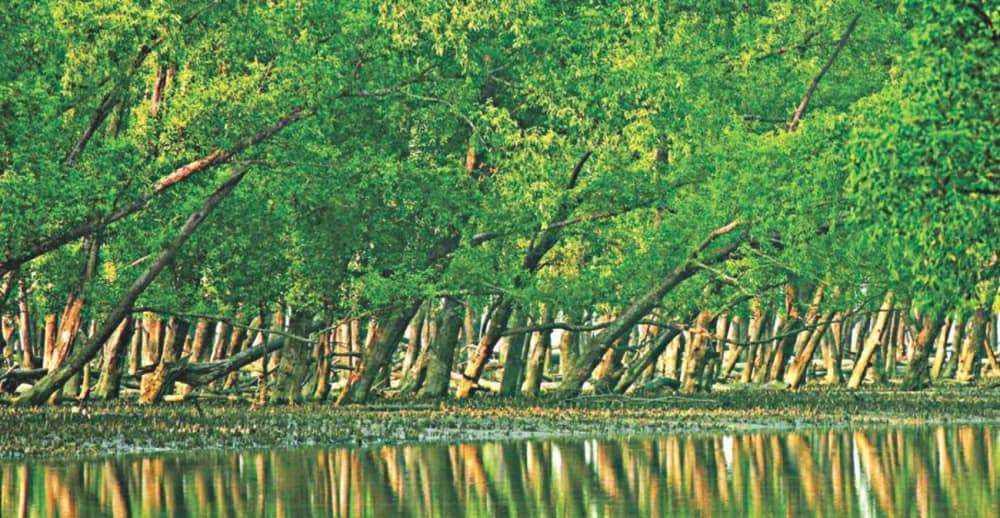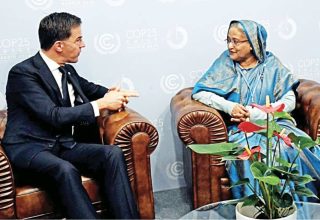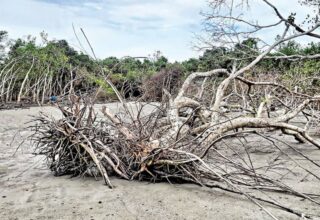
We are all immensely proud of the economic development being achieved by Bangladesh and looking forward to our graduation from Least Developed Country (LDC) status to middle income country status within the next few years. However, as we move our development pathway forward we are facing a very significant fork in the road ahead and we will have to make some brave choices that will determine the quality of our development over the coming decade or more.
This decision is regarding how we decide to treat the environment and climate change as we make our investment decisions going forward. At the moment we are headed in the wrong direction with economic growth being achieved at the cost of destroying our environment and making us more vulnerable to adverse climate change impacts and this is an unsustainable pathway in the long run.
One of the new concepts that has emerged out the United Nations Climate Summit held in New York last month was the promotion of the emerging concept of Nature Based Solutions (NbS) for Development going forward.
This concept, although a new term, encompasses previously used terms such as Ecosystem-based Adaptation (EBA) or Participatory Natural Resource Management (PNRM) or other similar concepts that have been in vogue for some time now.
What is new about NbS is that it draws on the older concepts which were largely confined to the world of nature conservation and adds them to the spheres of development as well as Climate Change for both mitigation as well as adaptation. Hence it is a much wider concept that needs to be understood by development decision makers, both in the public and private sectors.
This is particularly important for a country like Bangladesh where over 160 million people live in less than 150,000 square kilometres on the delta of three of the world’s biggest rivers. Our development pathway to take our people out of poverty must necessarily be compatible with preserving and conserving the ecosystems in which we live.
This now includes not only the natural ecosystems such as forests, rivers and wetlands as well as the sea, which are very important, but also the farms and towns where people live. We need to find nature based solutions in each and every ecosystem, village and town in Bangladesh if we want to achieve genuine sustainable development for our people and planet going forward.
In the past we have too often sacrificed our natural ecosystems like forests and wetlands in the name of development which has proved to be short-lived and given rise to new problems.
To cite two interesting examples, we have made considerable gains in enhancing our tree cover over the last few decades while also enhancing fish production at the same time. However, while these are indeed laudable achievements, the tree cover has been enhanced outside our natural forests whose extent has actually declined and similarly the fish production increase has come from aquaculture with a limited number of species while our open water fisheries with hundreds of species has declined very considerably.
This loss of biodiversity of both trees and fish is a very important loss that we need to rectify going forward. Simply having more trees and more fish is no longer an acceptable goal in itself.
While every district and locality needs to address possible NbS for themselves I will focus on two major opportunities for us to take new and more environment friendly pathway going forward. If we do things right we can have our development as well as protect our environment, but if we do things wrong (and that is what we are doing now) we may achieve economic growth but it will be at the cost of our environment.
The first example I will cite is the Sundarbans which is the world’s biggest mangrove forest and a World Heritage Site—which means that we are responsible for protecting it not just for ourselves but for all of humanity. As we are developing the Padma bridge which will connect the southwest of Bangladesh, where the Sundarbans is located, with Dhaka we expect much greater economic development of that region which is a good thing. However, if we allow unchecked development of industries of the wrong kind then we can expect the forest to be depleted very rapidly and this is where we are headed unless we take measures to prevent the wrong kind of development and replace it with the right kind of development. This means preparing a red list of prohibited industries in the zone around the forest (and actually enforcing that prohibition), while promoting ecosystem friendly forms of development such as eco-friendly tourism.
The second example is the rapid expansion of Dhaka city to the east which is still consisting of largely wetlands and croplands. If we allow the unchecked construction to the east of Dhaka that we allowed for the existing parts of Dhaka, then we are going to see not just the loss of some important wetlands but the people who will live there will face flooding during heavy rainfall situations as we are already facing in Dhaka city now. We need to learn from our mistakes and not repeat them.
In this particular case it is not the lack of plans on paper, but the lack of enforcement or abiding by those plans by the authorities as well as the developers. Hence we will need to become better at policing ourselves as well as making the relevant authorities do their jobs properly.
Finally, we need to shift the development paradigm of our country from economic growth at any cost towards economic growth with environment protection, which is indeed possible if we are able to adopt concepts such as Nature Based Solutions for Development.
Originally this article was published on October 16, 2019 at The Daily Star. The author Dr. Saleemul Huq is the director of the International Centre for Climate Change and Development (ICCCAD) at the Independent University, Bangladesh (IUB).
Email: saleemul.huq@icccad.net






